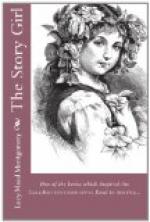Behind the house was a grove of fir and spruce, a dim, cool place where the winds were fond of purring and where there was always a resinous, woodsy odour. On the further side of it was a thick plantation of slender silver birches and whispering poplars; and beyond it was Uncle Roger’s house.
Right before us, girt about with its trim spruce hedge, was the famous King orchard, the history of which was woven into our earliest recollections. We knew all about it, from father’s descriptions, and in fancy we had roamed in it many a time and oft.
It was now nearly sixty years since it had had its beginning, when Grandfather King brought his bride home. Before the wedding he had fenced off the big south meadow that sloped to the sun; it was the finest, most fertile field on the farm, and the neighbours told young Abraham King that he would raise many a fine crop of wheat in that meadow. Abraham King smiled and, being a man of few words, said nothing; but in his mind he had a vision of the years to be, and in that vision he saw, not rippling acres of harvest gold, but great, leafy avenues of wide-spreading trees laden with fruit to gladden the eyes of children and grandchildren yet unborn.
It was a vision to develop slowly into fulfilment. Grandfather King was in no hurry. He did not set his whole orchard out at once, for he wished it to grow with his life and history, and be bound up with all of good and joy that should come to his household. So the morning after he had brought his young wife home they went together to the south meadow and planted their bridal trees. These trees were no longer living; but they had been when father was a boy, and every spring bedecked themselves in blossom as delicately tinted as Elizabeth King’s face when she walked through the old south meadow in the morn of her life and love.
When a son was born to Abraham and Elizabeth a tree was planted in the orchard for him. They had fourteen children in all, and each child had its “birth tree.” Every family festival was commemorated in like fashion, and every beloved visitor who spent a night under their roof was expected to plant a tree in the orchard. So it came to pass that every tree in it was a fair green monument to some love or delight of the vanished years. And each grandchild had its tree, there, also, set out by grandfather when the tidings of its birth reached him; not always an apple tree—perhaps it was a plum, or cherry or pear. But it was always known by the name of the person for whom, or by whom, it was planted; and Felix and I knew as much about “Aunt Felicity’s pears,” and “Aunt Julia’s cherries,” and “Uncle Alec’s apples,” and the “Rev. Mr. Scott’s plums,” as if we had been born and bred among them.
And now we had come to the orchard; it was before us; we had only to open that little whitewashed gate in the hedge and we might find ourselves in its storied domain. But before we reached the gate we glanced to our left, along the grassy, spruce-bordered lane which led over to Uncle Roger’s; and at the entrance of that lane we saw a girl standing, with a gray cat at her feet. She lifted her hand and beckoned blithely to us; and, the orchard forgotten, we followed her summons. For we knew that this must be the Story Girl; and in that gay and graceful gesture was an allurement not to be gainsaid or denied.




